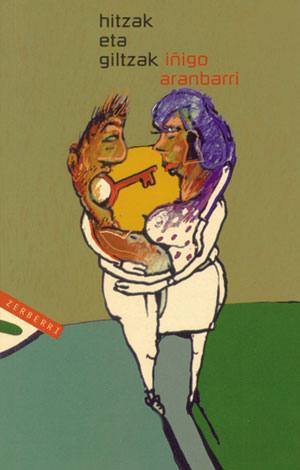
For a Hitzdeology
- Iñigo Aranbarri:: Words and Keys Alberdania Pages::104 Price: €9.5
Aritz Galarraga
2011ko azaroaren 02a

I assume that all the speaking communities will have, more or less, concern for the language in which they speak. As it is the most direct means of communication, the speaker tends to have doubts, attention, curiosity about what he is talking about. Moreover, the writer, who has language as the main tool of work, has been very concerned about words, dictionaries, grammar, and has written all of them in his head. Because the literature he does (sewing letters) makes it possible to turn these things around, dare, randomly, and even get into his hand. This is the case of Iñigo Aranbarri, author of the book Hitzak eta giltzak.
Ten years ago on the street, in the Zerberri section of the editorial Alberdania (remember: a collection of brief essays of all kinds), Hitzak eta giltzak is a reflection on language, or if you prefer, on the words that are part of language. Or reflection on language from words. And forward, about the society that speaks language. That is, the word is a journey without a specific destination. Aranbarri's essay is composed of short strokes, fine brushstrokes, clear words, fragments taken from here and there, an idea, an anecdote after, a note later. It is a space that moves many and varied areas (for example, the words they have made from the dwelling to the city). All the pleasures and instructions of the reader.
You have clarified some of the things you have written on these pages. For example, when he talks about flirting between politics and languages, making noise, paving the word to the enemy, creating his own lexicon, taking care of it, disseminating it. The responsibility of the informers, the media in general, in the healing of the words and the work they do. Not in vain, it will announce to us that the voice of power is modulated in them. And after saying this, it will put to us the importance of the Basque press, even if it is because of the number of words and expressions that each day puts into circulation in the street, “much more than literature can have”. And a writer tells us.
It's hard to summarize here everything that gets excited throughout the book. But I can't help but say that Aranbarri, who likes the second laps of words that philological archaeology has opened up his concerns about language in this collection of words and ideologies, in this brief and fruitful essay. The short and the strong is the only way to knock it down long and beautiful.
Ten years ago on the street, in the Zerberri section of the editorial Alberdania (remember: a collection of brief essays of all kinds), Hitzak eta giltzak is a reflection on language, or if you prefer, on the words that are part of language. Or reflection on language from words. And forward, about the society that speaks language. That is, the word is a journey without a specific destination. Aranbarri's essay is composed of short strokes, fine brushstrokes, clear words, fragments taken from here and there, an idea, an anecdote after, a note later. It is a space that moves many and varied areas (for example, the words they have made from the dwelling to the city). All the pleasures and instructions of the reader.
You have clarified some of the things you have written on these pages. For example, when he talks about flirting between politics and languages, making noise, paving the word to the enemy, creating his own lexicon, taking care of it, disseminating it. The responsibility of the informers, the media in general, in the healing of the words and the work they do. Not in vain, it will announce to us that the voice of power is modulated in them. And after saying this, it will put to us the importance of the Basque press, even if it is because of the number of words and expressions that each day puts into circulation in the street, “much more than literature can have”. And a writer tells us.
It's hard to summarize here everything that gets excited throughout the book. But I can't help but say that Aranbarri, who likes the second laps of words that philological archaeology has opened up his concerns about language in this collection of words and ideologies, in this brief and fruitful essay. The short and the strong is the only way to knock it down long and beautiful.